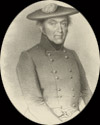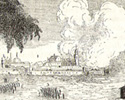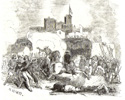19th Century´s militar history in the Basque Country
MIGUEL GOMEZ. (1785-1850)
 Gómez was born in 1785 in Torredonjimeno, Jaén. As a soldier, he was taken prisoner during the War of Independence and taken to northern Europe where he remained until the end of the conflict. He was rewarded for his service with the title of lieutenant and it was in this capacity that he served in the infantry regiment of Saboya.
Gómez was born in 1785 in Torredonjimeno, Jaén. As a soldier, he was taken prisoner during the War of Independence and taken to northern Europe where he remained until the end of the conflict. He was rewarded for his service with the title of lieutenant and it was in this capacity that he served in the infantry regiment of Saboya.
During the Liberal Triennium, he rebelled and joined Zumalacárregui in Navarre, obtaining the rank of captain at his side.
At the outbreak of the First Carlist War, he returned to join Zumalacárregui , who named him chief of his High Command. Gómez fought with Zumalacárregui in the battles of Nazar and Asarta, Vitoria and Alsasua, among others. In 1834, he escorted Don Carlos until he was appointed commanding general of Vizcaya. He then moved to Guipúzcoa to take up the same position there and was promoted to field marshal for his conduct in Guernica and the taking of Tolosa.
 The war was fought in three territories: the Basque country, Catalonia, and Aragon. The Carlists did attempt to spread the battle to the rest of Spain by organising a series of military expeditions, including one led by Gómez.
The war was fought in three territories: the Basque country, Catalonia, and Aragon. The Carlists did attempt to spread the battle to the rest of Spain by organising a series of military expeditions, including one led by Gómez.
 The Gomez Expedition set off in June 1836 with around 3,000 men in the direction of Asturias and Galicia. Within six months, this expedition had travelled across much of Spain, with the Liberal troops in pursuit. Gómez managed to take Oviedo, Santiago de Compostela, León, Palencia, Albacete, Córdoba, Almadén, Cáceres and Algeciras, though as soon as he left the cities he had taken, the Liberals entered and regained control, hence the aim of spreading the war was not met.
The Gomez Expedition set off in June 1836 with around 3,000 men in the direction of Asturias and Galicia. Within six months, this expedition had travelled across much of Spain, with the Liberal troops in pursuit. Gómez managed to take Oviedo, Santiago de Compostela, León, Palencia, Albacete, Córdoba, Almadén, Cáceres and Algeciras, though as soon as he left the cities he had taken, the Liberals entered and regained control, hence the aim of spreading the war was not met.
During these six months, he fought a number of Liberal soldiers. He defeated Tello and López in Baranda and Matilla, and forced Alaix and Espartero to retreat in Escaro and Villarrobledo. The generals Rodil and Narvaez also pursued him in vain. He managed to mobilise 25,000 Liberals behind his 6,000 men - taking into account those who joined him en route, which included Cabrera - but they could not put an end to the expedition, which returned to the Basque Country with slightly more men than it had left with.
Despite the achievements of the expedition, Gómez was arrested and brought to trial by the Carlists who accused him of not following orders. At the end of the war, he went into exile in France and returned to Spain during the insurrection of 1847 to 1849 as commanding general of Andalusia. After the failure of this new Carlist uprising, he returned to exile where he died shortly afterwards, and is buried in Bordeaux.

